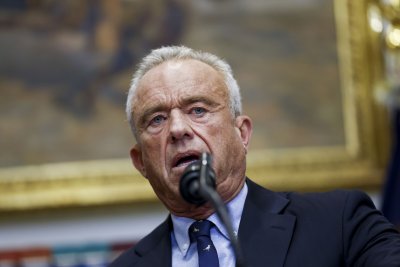CDC changes childhood vaccine schedule to align with other nations

Jan. 5 (UPI) — The U.S. Centers for Disease Control and Prevention on Monday announced that it is changing its childhood vaccination schedule to align with other developed nations.
The change, which is based on the vaccine practices in 20 “peer, developed nations,” most specifically Denmark, is aimed at reducing the number of vaccines and vaccine doses that children in the United States receive based on what officials at the Department of Health and Human Services say is too high a count of shots.
“After an exhaustive review of the evidence, we are aligning the U.S. childhood vaccine schedule with international consensus while strengthening transparency and informed consent,” HHS Secretary Robert F. Kennedy Jr., said in a press release.
“This decision protects children, respects families and rebuilds trust in public health,” he said.
The change was met with concern by a range of professional healthcare societies, including the American Association of Pediatrics and the Infectious Diseases Society of America.
“Today’s announcement by federal health officials to arbitrarilly stop recommending numerous routine childhood immunizations is dangerous and unnecessary,” Andrew D. Racine, president of the AAP, said in a statement.
“The longstanding, evidence-based approach that has guided the U.S. immunization review and recommendation process remains the best way to keep children healthy and protect against health complications and hospitalizations,” Racine said.
Kennedy has long been associated with anti-vaccine sentiments, including the debunked claim that vaccines cause autism and doubts expressed about COVID-19 vaccines that disregard study and real-world data.
Although he told Congress during his confirmation hearing in January 2025 that he is not anti-vaccine, since taking over the HHS he has canceled several vaccine research programs at the CDC and Food and Drug Administration and fired a wide range of experts who have long worked on vaccines and vaccine policy amid what he has said is an effort to rebuild citizens’ trust in government health agencies and the advice they offer.
Among Kennedy’s actions was firing all 17 members of a committee that makes recommendations about vaccines to the CDC and replacing them with a hand-picked selection of vaccine skeptics.
Kennedy last February said he was going to make investigating the benefits of the childhood vaccine schedule a priority, noting that he would take an “open mind” to what many consider “settled science” for vaccines against measles, mumps, rubella, hepatitis B and other infectious diseases.
According to the HHS, the CDC will continue to recommend that all are children receive vaccines against diphtheria, tetanus, whooping cough, Haemophilus influenza B, pneumococcus, polio, measles, mumps, rubella, HPV and chickenpox.
Vaccines that the agency is recommending for high-risk groups are RSV, hepatitis A, hepatitis B, dengue and meningococcus.
And the CDC is now recommending that vaccines for rotavirus, COVID-19, influenza, meningococcal disease, hepatitis A and hepatitis B are given based on shared clinical decision-making.
The HHS and the CDC said the changes are based on the United States recommending more childhood vaccine doses than any other peer nation, and twice as many as some European nations, and that data is insufficient to suggest the formerly recommended shots are necessary.
The agencies also said that the new schedule allows for more flexibility and choice, with less coercion.
Experts have expressed doubt about the need or benefits for the changes, saying that there is not data to back up the changes and they will potentially lead to the spread of diseases that can be prevented.
Amesh Adalja, physician and senior scholar at the Johns Hopkins Center for Health Security, told UPI that the effect of the changes, which he called intentional, will be to decrease the uptake of certain vaccines in the United States and that there is no scientific justification for them.
“This will lead to predictable increases in illness, disruption, hospitalizations and — with certain infections — deaths,” Adalja said. “Individuals will be confused regarding what is actually recommended.”
He said that the burden on primary care doctors will increase as they not only help their patients navigate issues and decisions, but will likely increase the care that some people need.
“The decision was entirely arbitrary because some people ‘felt’ that the number of diseases vaccinated against was too high, akin to those who are afraid of the numbers 13 or 666,” Adalja said.

